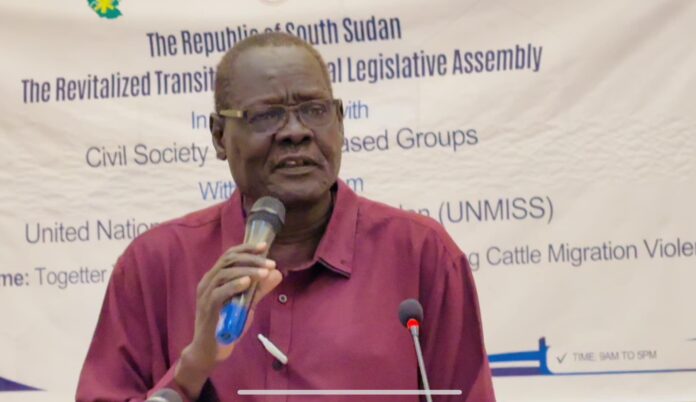By Otto Abut
In a positive and cooperative atmosphere, the Bor Community, through its leadership, has agreed to withdraw all its cattle from the Equatoria Region. This decision was made during a one-day high-level consultative meeting held on Thursday, February 13, 2025, to address the ongoing violence related to cattle migration across the three states of Jonglei, Eastern and Central Equatoria, and the Greater Pibor Administrative Area.
The meeting, initiated by the Church, civil society organizations, the Transitional National Legislative Assembly (TNLA), and the United Nations Mission in South Sudan (UNMISS), comes on the heels of rising tensions and conflicts between cattle keepers from Jonglei State and farming communities in the Equatoria region, particularly in Magwi County.
During the meeting, leaders from the affected states were allowed to present their views and discuss potential solutions to the escalating violence.
One of the key outcomes was the Bor Community’s commitment to withdrawing their cattle from Equatoria, a decision that was confirmed by Peter Wal Athou, the Deputy Chairperson of the Bor Community.
He emphasized the community’s dedication to following through on this resolution, calling on the government to provide logistical support to facilitate the swift transportation of the cattle back to their original areas.
“We want to assure you that the cattle will be taken back,” stated Wal Athou.
He added that the Bor community leadership is fully committed to complying with the President’s order to return the cattle to their places of origin.
The Bor community representative also highlighted several challenges, including recurring diseases that have forced cattle herders to seek pasture in the Equatoria region. He expressed hope that the withdrawal would help ease tensions and prevent further conflict.
Meanwhile, the Commissioner of Magwi County, Pole Pole Benjamin Olum, pointed out that Magwi has been grappling with the influx of cattle since 2018. Despite previous resolutions aimed at addressing the issue, none of them have been effectively implemented. Olum emphasized that the people of Magwi County are not seeking conflict but simply want the cattle removed ahead of the planting season.
He stressed that the authorities in Magwi County are keen to create a peaceful environment that would allow local communities to return to their homes and prepare for the upcoming elections.
During the high-level meeting, 15 key resolutions were made to address the conflict caused by cattle migration. These resolutions include the formation of a joint committee to implement the 2017 Presidential order on the evacuation of cattle from the Equatoria region, investigating the recent violent incidents in Magwi County, and recovering and returning the raided cattle, including the 7,000 cattle taken from the Dinka Bor cattle herders during the recent Magwi incident.
Additionally, compensation will be provided for the destroyed crops and properties belonging to the people of Magwi County.
The meeting was chaired by the First Vice President of South Sudan, H.E. Dr. Riek Machar Teny Dhurgon, who serves as the Chair of the Governance Cluster.
These resolutions mark a significant step toward mitigating the tensions between farmers and cattle herders, promoting peace and stability in the affected regions of South Sudan.

